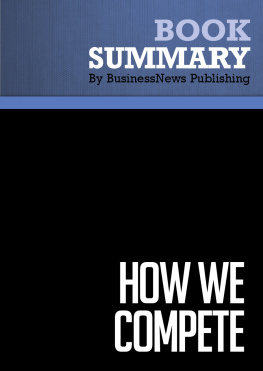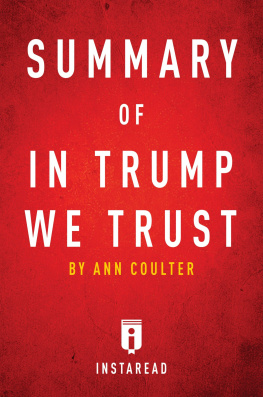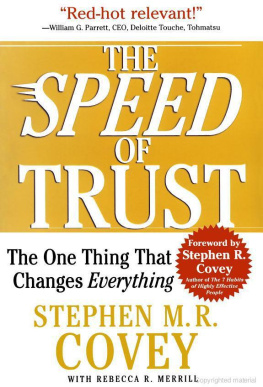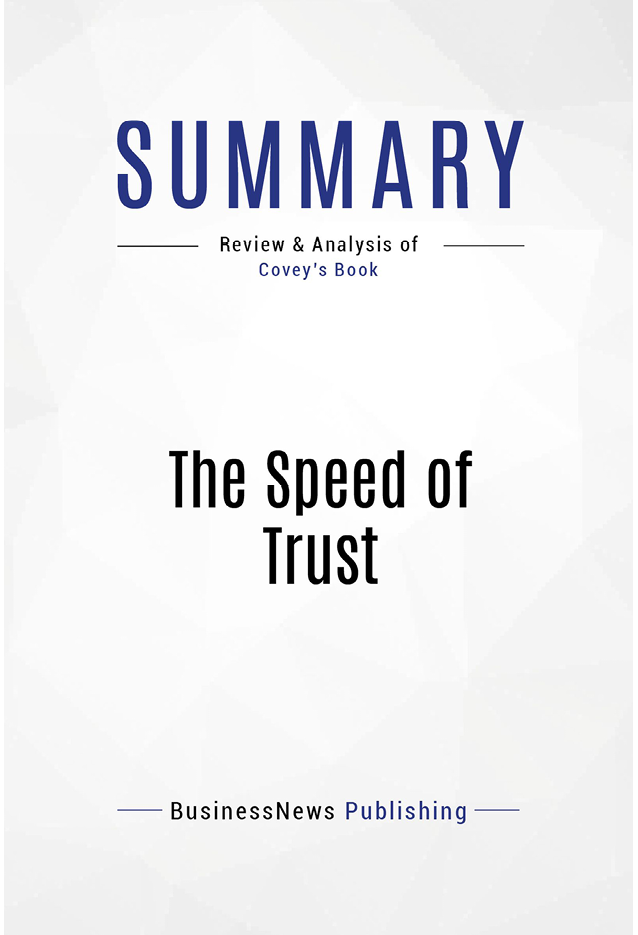Book Presentation:
The Speed Of Trust by Stephen M. Covey
Book Abstract
MAIN IDEA
Trust is not something which is merely touchy-feely or nice-to-have. Rather, trust is a hard-nosed business asset which can deliver quantifiable economic value. When trust is high, speed of execution goes up and costs go down. For that and other sound reasons, it makes good financial sense to consistently find ways to enhance trust levels both within and external to your business organization.
To build and enhance trust, you need a workable mental model. Visualize trust as being like the ripple effect which occurs when a drop falls into a pool of water. That drop will generate a number of concentric waves. Trust is like this because it always flows from the inside out. In the case of increasing trust, there are five waves, each of which represents a context in which trust is established.

To turn trust from an intangible into an economic driver of value for you personally and for your business organization, work to consistently build the trust which exists in each of these five waves.
Trust impacts us 24/7, 365 days a year. It undergirds and affects the quality of every relationship, every communication, every work project, every business venture, every effort in which we are engaged. Contrary to what most people believe, trust is not some soft, illusive quality that you either have or you dont; rather, trust is a pragmatic, tangible, actionable asset that you can create much faster than you think possible. I am also convinced in every situation nothing is as fast as the speed of trust. And, contrary to popular belief, trust is something you can do something about. In fact, you can get good at creating it.
Stephen M. Covey
About the Author
STEPHEN M. COVEY is cofounder and CEO of CoveyLink Worldwide, a learning and consulting practice. He is the former CEO of Covey Leadership Center and the son of Stephen R. Covey, the author of The 7 Habits of Highly Effective People. Stephen M. Covey is a highly accomplished keynote speaker and advisor on trust, leadership, ethics and high performance. A graduate of Harvard Business School, Mr. Covey serves on the boards of directors or advisory boards for a number of companies including the Human Performance Institute.
The Web site for this book is at www.speedoftrust.com .
Important Note About This Ebook
This is a summary and not a critique or a review of the book. It does not offer judgment or opinion on the content of the book. This summary may not be organized chapter-wise but is an overview of the main ideas, viewpoints and arguments from the book as a whole. This means that the organization of this summary is not a representation of the book.
Summary of The Speed Of Trust (Stephen M. Covey)
1. Self-trust: Credibility
Self-trust is derived from your abilities and your capacity to set and achieve goals and keep commitments. If you walk your talk, then youll feel good about your actions. That inner-sense of contentment and consistency then makes it possible for you to be worthy of the trust of others. Credibility is derived from four core sources, each of which you should seek to build:
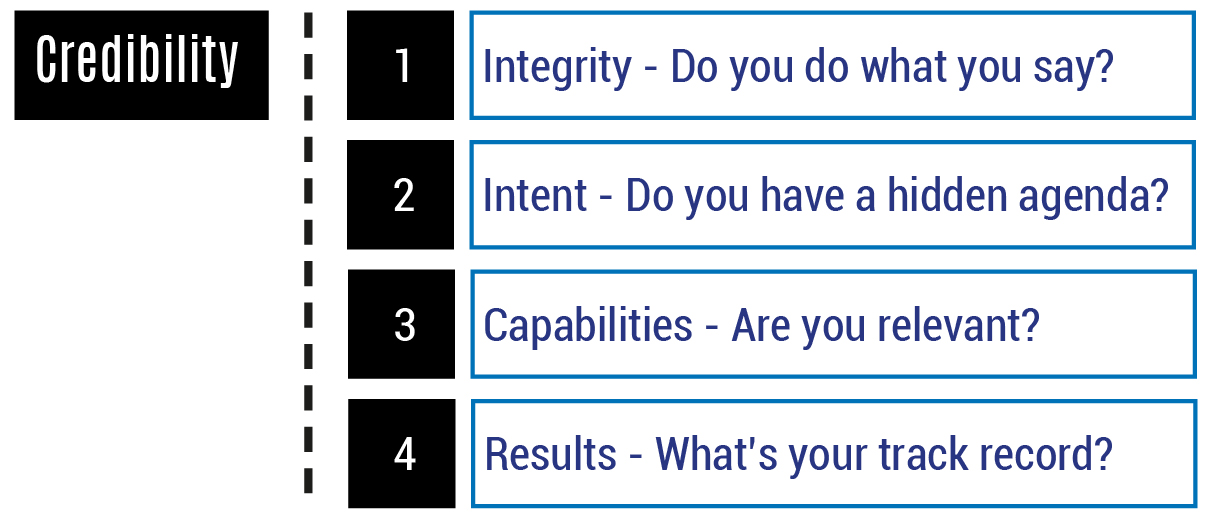
Before it becomes possible to build trust with others, you first have to trust yourself. This is an inside-out approach. To have credibility with others in society, you first need to have an internal foundation you feel good about. Credibility essentially boils down to two questions people everyone needs to be able to answer:
- Do I trust myself?
- Am I someone others can trust implicitly?
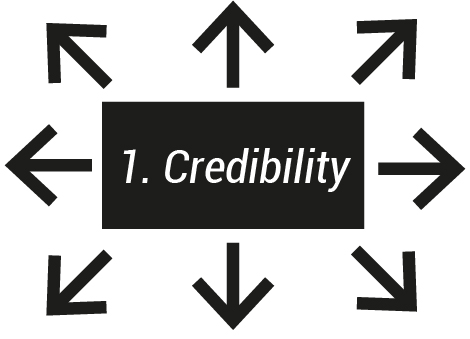
Enhancing and building your personal credibility is something you can do proactively rather than being forced to work with what currently exists. You can choose to enhance credibility through the decisions you make and the actions you take. Equally, personal credibility becomes diluted and dissipates when you make decisions you dont feel good about at a personal level.
There are four foundation elements or cores that will make you credible or believable, both to yourself and others:
1. Integrity Do you do what you say?
Most people equate honesty with integrity, but it actually includes much more. To have integrity means to act in accordance with your personal values and belief system at all times and in all circumstances. Integrity is like the roots of a tree in that it lies under the surface and yet it is absolutely vital to the nourishment and stability of the entire tree.
Integrity certainly involves telling the truth but it also includes:
- Congruence acting in ways which harmonize completely with your personal beliefs and values. People with congruence are the same inside and out, in private and in public.
- Humility being more concerned about what is right than being right, about acting on good ideas rather than defending a position, about recognizing contribution instead of worrying about being recognized.
- Courage the intestinal fortitude to do the right thing, even when its hard and may have some kind of personal cost involved in one way or another.
To increase your integrity:
- Get into the habit of making and then keeping personal commitments to yourself which in practical terms means you probably should make less commitments, not more. Dont make commitments impulsively but treat each as an important undertaking.
- Stand for something bigger than yourself perhaps by creating a personal mission statement which articulates what you want to be known for. Then show by your actions you want to stand for the right things.
- Be candid and open never be afraid of looking at new and different ways to get the right things done. Have the humility and courage to admit you dont know everything and learn from others. This creates the kind of trust which underpins your personal integrity.
I look for three things in hiring people. The first is personal integrity, the second is intelligence, and the third is a high energy level. But, if you dont have the first, the other two will kill you.
Warren Buffett, CEO, Berkshire Hathaway
2. Intent Do you have a hidden agenda?
Intent is vital to your credibility. Even if you have integrity, capability and results, if your intent is poor people will question your motives seriously. The key components of intent are:
- Motives your reason for doing one thing and not another. The motive which will inspire the greatest amount of trust is when you genuinely care about the wellbeing of others.
- Your agenda what you intend to achieve. The agenda which inspires the greatest amount of trust is generally seeking for mutual benefit and win-win outcomes.


